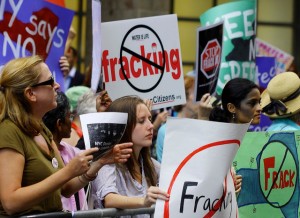
Fracking Causes Blowouts too
Another day and yet another reported problem with fracking.
Canadian regulators are now investigating the possibility that fracking could have caused a blowout in a neighbouring well which was producing oil several hundred metres away.
The country’s Energy Resource Conservation Board was alerted last Friday after a landowner saw black fluid spraying fifteen metres into the air from a neighbour’s well. It is now investigating whether fracking by Calgary-based Midway Energy could have affected a nearby producing oil well owned by Wild Stream Exploration.
“We don’t know the details yet so it is premature to comment on the process, but my understanding is that it appears the fracturing process affected the other well,” said Cara Tobin, a spokeswoman for the Conservation Board. Five similar incidents of fracking interfering with an existing well have been reported since 2005, Tobin adds.
“We’re still not quite sure what happened,” said Scott Ratushny, Midway Energy chief executive. “We’re still investigating it, but something allowed the frack to carry into the same zone, 130 to 140 metres away (underground).”
This is precisely the problem with fracking. The oil industry continues to argue that the process involves precision drilling and has known risks that can be mitigated.
But everywhere the industry goes there have been problems. Even wells being used to dispose of fracking waste are being linked to earthquakes.
Authorities in Ohio have become alarmed over a string of earthquakes in the town of Youngstown, which suffered 11 earthquakes last year. All the quakes have been near wells used for disposal of fracking waste.
The strongest, which was a magnitude 4.0, hit on New Year’s Eve. As a result of the earthquakes, the Ohio Department of Natural Resources announced it would suspend operations at five injection wells in the area.
Despite this the mayor of Youngstown, has even gone as far as to buy earthquake insurance because of the quakes. “You lose your whole house, that’s your life savings, and if you have no money or no insurance to replace it, then what do you do?” Mayor Charles P. Sammarone has said. “Information is needed to make the homeowner and the residents feel safe.”
Meanwhile in New York, a former staffer at a state government agency responsible for regulating fracking, has warned that allowing the controversial technique would lead to contamination of the state’s aquifers and drinking water.
Paul Hetzler said: “I’m familiar with the fate and transport of contaminants in fractured media, and let me be clear: hydraulic fracturing as it’s practised today will contaminate our aquifers. Not might contaminate our aquifers. Hydraulic fracturing will contaminate New York’s aquifers. If you were looking for a way to poison the drinking water supply, here in the north-east you couldn’t find a more chillingly effective and thorough method of doing so than with hydraulic fracturing.”
Hetzler calles the proposals for hydraulic fracturing in New York state “insane”, adding: “I’m not saying anywhere you drill will cause a huge catastrophe. There might be a location where geological conditions are favourable, where contaminants don’t travel. But the Marcellus shale is not a homogeneous layer. You can’t predict what is going to happen.”
Slowly but surely we can now predict what will happen: pollution, blowouts and earthquakes to name just three of the problems.
And the industry continues to argue it is safe.

